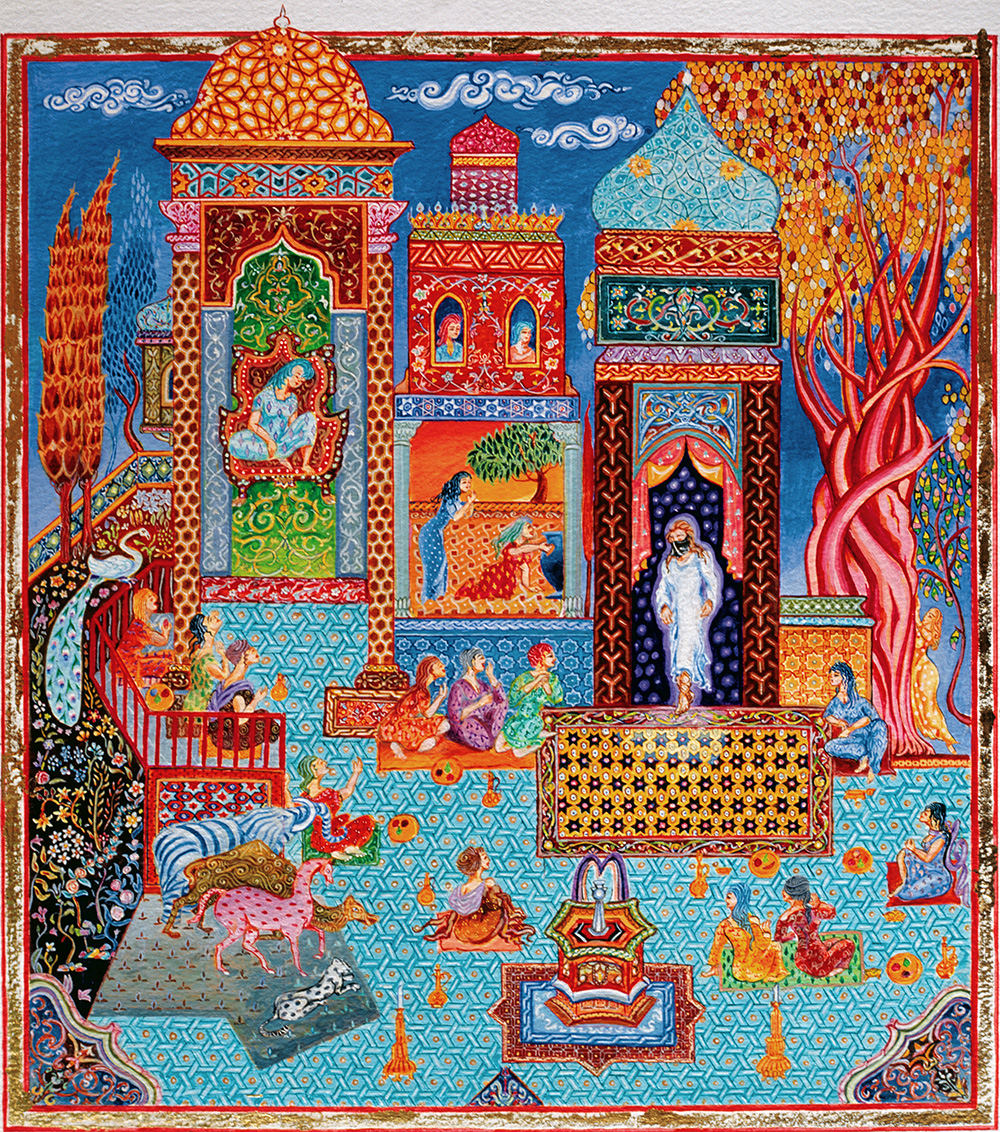Kur’an’da Hz Yusuf’un hikâyesi için “hikâyelerin en güzeli” (Ahsen-i Kassas) tabiri kullanılmaktadır. Hikâye Hz Yusuf’un çocuk yaşında ayın ve güneşin kendisine secde ettiğini gördüğü rüyayı babası olan Hz Yakup’a anlatması ve bunun tabirini sorması ile başlıyor. Hz. Yakup oğluna gördüğü bu rüyayı üvey kardeşlerine anlatmamasını zamanı gelince bütün bunların ne anlama geldiğini anlayabileceğini söyler. Bu arada, üvey kardeşleri babalarının içlerinde en çok Yusuf’a düşkün olmasının verdiği kıskançlıkla bir mizansen hazırlayıp ondan kurtulmayı ve böylece babalarının sevgisine daha çok mazhar olmayı ümit ederek, babalarının gönülsüzce verdiği izinle Yusuf’u beraberce koyun otlatmaya diye evden çıkartırlar. Sonra onu yol üstünde kör bir kuyuya atarak eve dönünce babalarına “Onu kurt yedi, işte bu da onun kanlı gömleği” diye bir yalan uydururlar. Hz. Yusuf kuyunun dibinde kendisine ilham olan bir güç ile beklerken, yoldan geçen kervancılar onu bulur ve köle olarak satmak üzere Mısır’a götürürler. Mısır’da az bir paraya devrin vezirine satılan Yusuf (Yusuf Suresi 7-20) gelişip büyüyünce güzellikte eşsiz bir delikanlı olur. Vezirin hanımı Züleyha ise kendisine âşıktır. Bir gün kapıları kapatarak onunla beraber olmak ister. Aslında Hz. Yusuf’un gönlünde de vezirin güzel hanımına karşı sevgi vardır, ancak kendisine çocukluğundan beri büyük iyilikleri dokunan efendisine ihanet etmeme duygusu ile kendisini tutar ve hatta Züleyha’nın elinden kaçarak kurtulur. Bu kargaşada eve gelen vezir olanlar konusunda, hiçbir suçu olmadığına ikna olmasına rağmen Hz.Yusuf’un bir müddet zindanda hapsedilmesini uygun bulur. Bu arada şehrin ileri gelenlerinin hanımları, kölesine olan aşkı yüzünden düştüğü durumu alaylı bir dedikoduya dönüştürürler. Bu dedikodular Züleyha’yı derinden etkiler ve etrafındakilere Yusuf’un ilahi güzelliğini göstererek kendisini kınayan kadınlara bir ders vermeye karar verir. Onları evine davet eder, önlerine çeşitli meyveler ve birer bıçak koyar. Sonra Yusuf’u çağırır. “Ona içer gir denildi.” (Yusuf suresi 31) . Resim işte tam bu anı betimlemektedir. Davetli hanımlar içeri giren Hz.Yusuf’u görünce “-Bu bir insan olamaz, olsa olsa bir melektir” diyerek şaşkınlıktan ellerini ve parmaklarını keserler. Bir anlamda Züleyha’ya hak verirler. Hz. Yusuf’un hikâyesi hep böyle olağanüstü pozitif enerji yüklü olaylarla sürüp gider, ta ki O’nun kardeşleri ile barışarak mutluluk ve zenginlik içinde babasına kavuşana kadar.
Hz. Yusuf and Züleyha
The story of Hz. Yusuf is said to be the best story in the Quran. When Hz. Yusuf was a child he saw in his dream that the sun and the moon were prostrating in front of him. He told his dream to his father Hz. Yakub and asked him the meaning. His father warned him not to tell it to his stepbrothers in order not to make them jealous and said : “when you grow up you will understand what this dream means”. His stepbrothers were already jealeous of him as their father was fond of Yusuf. Hence his stepbrothers devised a plan to get rid of Yusuf hoping to gain their father’s love. They asked permission for going grazing sheep alltogether with Yusuf. Yakup reluctantly gave permission. They came to grassland. There was a dry well near the path. They threw Yusuf to the well. When they returned home, they adapted a fake story that a wolf had eaten Yusuf and brought his bloody shirt. Yusuf was at the bottom of the well and he was waiting with a power that inspired him. A caravan was passing by the path. They rescued Yusuf and brought him to Egypt to be sold as a slave. After then he was sold to the vizier for a small price. Yusuf (Yusuf sura, Quran 7-20)grew up and became incomparable handsome. The viziers wife Züleyha was in love with Yusuf. One day Züleyha closed the doors and wanted to make love with Yusuf. Yusuf also loved her but he didn’t want to betray the visier who was benevolent to him since his childhood. He controlled himself and with his clothes teared from his back, escaped from Züleyha. In this turmoil the vizier came home and he was convinced that Yusuf had no guilt. Nevertheless he found appropriate that Yusuf be held in prison. Ladies of the notable men in the city, mocked and gossiped Züleyha because of her love for her slave. Züleyha was very sorry. She wanted to give a lesson to the ladies who condemned her. She invited the ladies, offered fruits and for each of them a knife. She invited Yusuf in, she said “come in”(Yusuf sura, Quran,31). The painting describes this exact moment. When he came in and the ladies saw the divine beauty they said “this can’t be a human he should be an angel” and cut of their fingers with the knifes in their hands and in a sense ladies approved Züleyha. Hz. Yusuf’s story continues with extraordinarily positive events. At the end Hz.Yusuf became famous, rich, Pharaoh’s master of treasure, reconciled with his stepbrothers and embraced his father Hz.Yakup with happiness.
In Taberi history it was written, Hz. Yusuf had eventually married to the wife of the deceased visier and the visier was impotent. In Tevrat there is no throwing to the well story. Instead of this, stepbrothers intention was to kill Yusuf. One of the brothers Yehuda proposed to sell him to the Caravan owners which was more profitable and he convinced the brothers. Then Hz. Yusuf was sold to Caravan owners, when brothers came home they showed the bloody shirt of Yusuf and told that he was dead. Hz. Yakup was so sad, he beleived to the fake story and teared flutteringly his clothes into pieces.(Tekvin XXXVII/21-35)
Taberi tarihinde, sonunda ölen vezirin karısı ile evlendiği, vezirin aslında iktidarsız olduğu hiâayeleri eklenmiştir. Bu günkü Tevrat’ta ise Hz.Yusuf’un kuyuya atılması hikâyesi yoktur. Yalnız birlikte koyun otlatmaya çıktıklarında kardeşlerinden Yehuda’nın, O’nu öldürmektense, yoldan geçen kervancılara satmanın daha kazançlı olacağı söyleyerek diğer kardeşlerini ikna ettiği ve Hz. Yusuf’un böylece Mısır’a giden Kervancılara esir olarak satıldığı, kardeşler eve dönünce babalarına Yusuf’un kanlı gömleğini göstererek öldüğünü söylemeleri anlatılır. Ancak -Kur’an’ın aksine- Hz. Yakup’un buna inanıp üzüntüden üstünü başını yırttığı yazılır (Tekvin XXXVII/21-35).
